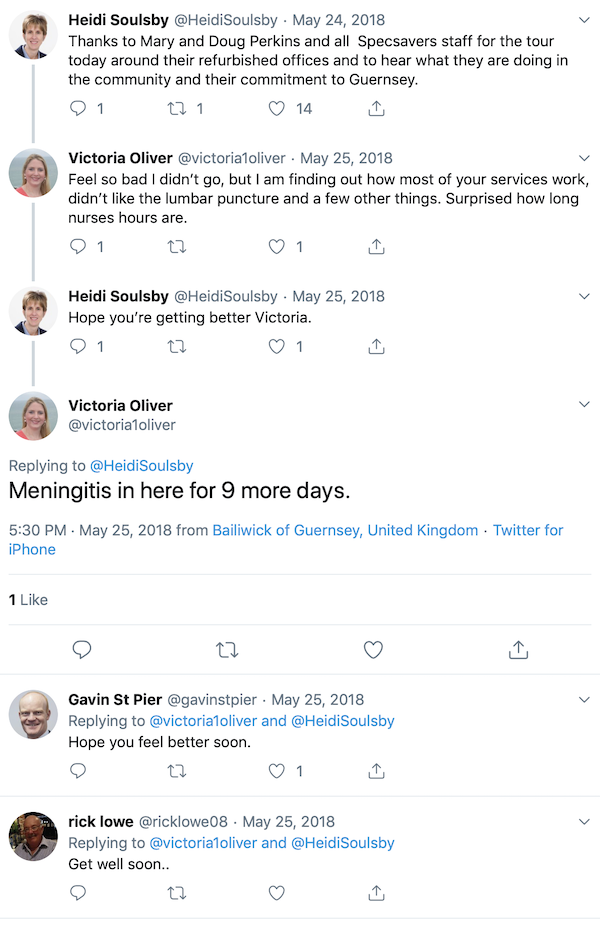


Deputy Victoria Oliver has spoken out about being told she had just two days left to live when she eventually sought treatment privately in the UK after being initially misdiagnosed in Guernsey.
The condition UK doctors recognised immediately was in fact a rare disease called Addison's which affects cortisol levels - in this case to a very nearly fatal degree.
In spring last year the Home Affairs and Department for Planning Authority member began to experience debilitating symptoms which followed on from a traumatic surgery due to arthritis. The extreme lethargy and joint pain led staff at the Princess Elizabeth Hospital to misdiagnose Deputy Oliver as having contracted viral meningitis.
The symptoms lasted for around three months in total, which Deputy Oliver said was especially difficult having recently had another child. Admission to the PEH itself lasted a few weeks where she was placed on a course of Aciclovir which can severely affect the organs.
Deputy Oliver was in need of an emergency dose of cortisol with her levels almost nil when she was eventually admitted to the London hospital at the behest of a family member. Now Deputy Oliver said she wants to raise awareness of the disease which affects 1 in 100,000 people.

Pictured: Deputy Oliver.
"I was sleeping for 20 hours a day which I was told by the MSG was ok. I'd lost a lot of movement I was so weak all the time.
"Addison's is basically my adrenal glands don't work but you can live a normal life as long as you take steroids. The symptoms are extreme tiredness, a craving for salt and very low blood pressure. Even a good tan from January, I had a great tan last year, that's actually a symptom of Addison's," she said.
By the time Deputy Oliver was diagnosed she had the characteristic blackened gums and "rust" coloured palms typical of the disease.
"In London they took one look at me and told me what it was. They said I would have had two days left to live if I hadn't been to see them," she said.
Deputy Oliver was then given 360 mg of steroids via injection which saved her life.

John F Kennedy (pictured above) famously lived with Addison's disease and the frustrating thing for Deputy Oliver is that it should be a commonly known affliction easily spotted with a combination of patient care and procedural adjustment.
"Every doctor is trained in Addison's, it's not as if it's a tropical disease. I'm very, very disappointed.
"The big thing is that if they'd listened to their patients they'd have come to a diagnosis. I am going to speak to Heidi [Deputy, Soulsby. President of the Committee for Health and Social Care] about the complaints procedure. Because I saw a locum [temporary practitioner] they couldn't do anything about it," she said.
The silver lining for Deputy Oliver - as well as raising awareness about the under recognised and under funded disease - is that the way in which blood tests are processed in the PEH has now changed as a result of her complaint.

Pictured: Tweets from Deputy Oliver's account last year showing when she was hospitalised with suspected meningitis.
"One thing I'm proud of is that I've managed to change some things, somebody should have looked up my bloods when the cortisol levels were troublingly low, now if there's an abnormal level in any of the bloods it isn't just seen by the person who ordered the bloods and might only be looking for one specific thing. Now it will go to the doctors and the MSG it's on a tracker system.
"It was really serous it wasn't getting to the doctor unless they were looking at that file.
"Anything slightly abnormal all goes through. They've changed a lot as a result of how badly this went, now no-one else will go through what I've been through with the bloods misread." she said.
Further checks will be put in place to ensure that abnormal levels noticed in blood work cannot be overseen without a considered analysis such as a 'read' function on the IT system similar to an email notification.
The ongoing care for Addison's patients is not as extensive as for those with Diabetes for example whereby regular blood checks can be undertaken and addressed accordingly by the patient, but Deputy Oliver has to be aware of any onset in symptoms.
"Deputy Prow who sits next to me in the States knows what to do if I need a steroid injection, not that I think that is very likely. Generally just making your colleagues aware," she said.
Spokespeople for both HSC and MSG said they could not comment on individual cases. The HSC spokesperson outlined the complaints procedure for anyone facing difficulties as a result of their treatment in Guernsey.
"If any of our service users are dissatisfied with the care or treatment they have received we would encourage them to contact the Customer Care Team at Health and Social Care 725241 or the Medical Specialist Group 238565 for further assistance. The Customer Care Team ensure that all formal complaints are fully investigated through our formal complaints process which is available at www.gov.gg/customercarehsc ."
Pictured top: Deputy Victoria Oliver entering the States.
Comments
Comments on this story express the views of the commentator only, not Bailiwick Publishing. We are unable to guarantee the accuracy of any of those comments.